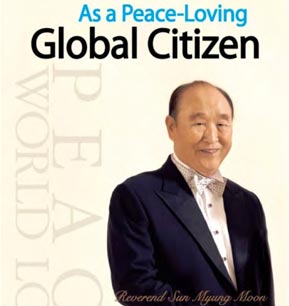ShareThis
Rev. Sun Myung Moon

As a Peace-loving Global Citizen is the autobiography of Rev. Sun Myung Moon, the founder of the Unification Movement. It was published in 2009 in both Korean and English by Gimm-Young Publishers of Seoul, South Korea. The book was released in South Korea on March 9, 2009 and debuted at #3 on the Businesss bestseller's list. It has ranked in various bestseller lists since then and was ranked 15th on the General bestseller's list as of October 14, 2009.
CHAPTER TWO - A River Of Heart Flows With Tears
A Grain of Rice Is Greater
Than the Earth
Than the Earth
In May 20, three months a.er being placed in Pyongyang Prison, I was moved to Heungnam Prison. I felt indignation and also shamed before Heaven. I was tied to a thief so I could not escape. We were taken by vehicle on a route that took seventeen hours. As I looked out the window a powerful feeling of grief welled up inside me. It seemed incredible to me that I would have to travel this winding road along rivers and through valleys as a prisoner.
Heungnam Prison was a concentration camp for special laborers working in the Heungnam Nitrogen Fertilizer Factory. During the next two years and five months I underwent hard compulsory labor. Compulsory labor was a practice that North Korea learned from the Soviet Union. The Soviet government could not simply kill members of the bourgeoisie and other people who were not communists, because the world was watching and they needed to be mindful of world opinion. So it came up with the punishment of compulsory labor. People who were exploited in this way were forced to continue working until they died of exhaustion. North Korean communists copied the Soviet system and sentenced all prisoners to three years of compulsory labor. In reality, the prisoners would usually die from the labor before their terms were up.
Our days began at 4:30 in the morning. We were made to line up in formation on the field, and our bodies and clothing were inspected for contraband items. We took off all our clothing, and each item was thoroughly inspected. Each piece of clothing would be beaten for so long that even the last speck of dust would not remain. The entire process took at least two hours. Heungnam was on the seacoast, and in the winter the wind was as painful as a knife as it cut into our naked bodies. When the inspection was over we would be fed an awful meal. Then we would walk two and a half miles to the fertilizer factory. We were marched four abreast, were made to hold the hand of the person next to us, and could not even hold our heads up. Guards armed with rifles and pistols surrounded us. Anyone who caused his row to start falling behind, or failed to hold on to the hand of the person next to him, was beaten severely for trying to escape.
Heungnam Prison was a concentration camp for special laborers working in the Heungnam Nitrogen Fertilizer Factory. During the next two years and five months I underwent hard compulsory labor. Compulsory labor was a practice that North Korea learned from the Soviet Union. The Soviet government could not simply kill members of the bourgeoisie and other people who were not communists, because the world was watching and they needed to be mindful of world opinion. So it came up with the punishment of compulsory labor. People who were exploited in this way were forced to continue working until they died of exhaustion. North Korean communists copied the Soviet system and sentenced all prisoners to three years of compulsory labor. In reality, the prisoners would usually die from the labor before their terms were up.
Our days began at 4:30 in the morning. We were made to line up in formation on the field, and our bodies and clothing were inspected for contraband items. We took off all our clothing, and each item was thoroughly inspected. Each piece of clothing would be beaten for so long that even the last speck of dust would not remain. The entire process took at least two hours. Heungnam was on the seacoast, and in the winter the wind was as painful as a knife as it cut into our naked bodies. When the inspection was over we would be fed an awful meal. Then we would walk two and a half miles to the fertilizer factory. We were marched four abreast, were made to hold the hand of the person next to us, and could not even hold our heads up. Guards armed with rifles and pistols surrounded us. Anyone who caused his row to start falling behind, or failed to hold on to the hand of the person next to him, was beaten severely for trying to escape.
Wednesday, November 24, 2010
|
Labels:
A Grain of Rice Is Greater Than the Earth part1
|
CONTENT
- FOREWORD
- CHAPTER ONE - Food is Love
- CHAPTER TWO - A River of Heart Flows with Tears
- CHAPTER THREE - The Man with the Fullest Stomach
- CHAPTER FOUR - Why We Work Globally
- CHAPTER FIVE - True Families Create True People
- CHAPTER SIX - Love Will Bring Unification
- CHAPTER SEVEN - Future of Korea, Future of the Wor...
- CHAPTER EIGHT - Message for Young People
